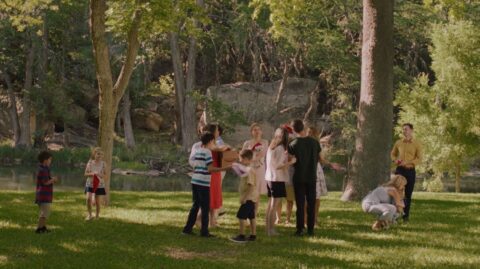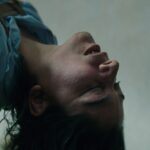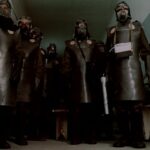Family is an ever-mutating, gestating thing, never quite the same from one year to the next. The eternal march of births, deaths, boyfriends, girlfriends, marriages, sickness, transformation and migration, ensures that there is no fixed point where one family can be said to be one way. But with a Christmas card, perhaps, some moments can be frozen in time forever, staring back at you, whispering: this is the way we were, if only for a little while.
Zooming in, zooming out, floating all about, ducking and weaving, slipping and sliding, the ever-elusive Concorso Cineasti del Presente entry Family Portrait (Lucy Kerr, 2023) creates an enigmatic family mosaic, collected from the different shards of subjective experience. With an air of the Modernist novels of Virginia Woolf or the short stories of Katherine Mansfield, Kerr creates a complicated, unsettling reverie about the impermanence of the family unit. It’s a fine calling card from debut director Lucy Kerr; slow, contemplative, beguiling and eerily compelling.
Katy (Deragh Campbell) is visiting her family in Texas with her boyfriend Olek (Chris Galust). Her mother Barbara (Silvana Jakich) is obsessed with capturing the perfect picture of the extended family together, encompassing various young ones, a pair of sisters, their mostly silent husbands and an opinionated father (Robert Salas).
In an excellent opening take, complemented by ambient, rustling, sound design and an increasing audible flow of indistinct voices, the family stumbles across the grass, multiple stories playing out in the middle of one take. Perhaps they are preparing for the photo itself, the film’s Edgar Allen Poe-quoting epitaph — “through a circle that ever returneth in / To the self-same spot” —suggesting that this image might already be the end of the story. Dropping us straight into this disorientating atmosphere, and playing heavily with the complications of image-making, Family Portrait asserts an unsettling tone right from the off, leaving the viewer to fill in the pieces.
Slowly but surely however, the individual players make their mark, the dialogue mostly naturalistic, spookily quiet, and the blocking obtrusive, characters covering each other, the constant use of focus pulling us into and out of different perspectives. One key conversation seems to illuminate the difficulty of capturing the perfect picture: a tale of a famous family member’s WW2, Pacific Theatre photograph being manipulated to appear to be from the Vietnam War. The image, once seen as the most accurate depiction of naked truth, can hide intangible inscrutabilities, torn apart and put together again in this fascinating film.
Further complications arise when a family relative dies of a mysterious virus, perhaps pneumonia or sepsis… or perhaps something far more contagious… perhaps one of the early cases of a worldwide pandemic… finally a film with something interesting to say about the coronavirus.
Kerr — continuing the understated Texan tradition seen in directors as diverse as Wes Anderson, Richard Linklater and Roberto Minervini — allows her actors to embody the roles instead of over-expressing themselves, further deepening the uncertainties. While some arthouse affectations — trees rustling in the wind, water shimmering across a river, characters walking through a dark wood — are gratuitous, Kerry maintains a fairly careful tone throughout the short 70-minute piece. The ever-changing family unit might be difficult to grasp, but the certainty of Kerr’s directing talent is self-evident through nearly every frame of this excellent debut feature.
Redmond is the editor-in-chief of Journey Into Cinema.





